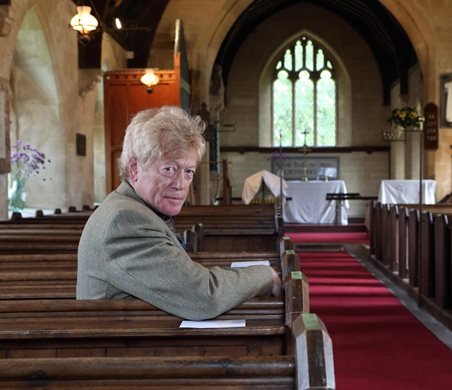Sir Roger Scruton is no longer among us. His life and his contributions have, (nihil nisi bonum) a very mixed reception in our circles – a reception they no doubt deserve. His passing, however, gives us an opportunity to reflect why they receive the mixed response they have enjoyed since the coming of age of the post-Conservative Right that fancies to call itself Reactionary, but some how a New Right; alternative, but traditional (ought they be capitalised?); or, your author’s favourite, archaeo-futurist. Scruton was the last of many things. He was the last Æsthete, the last Englishman, the last Peelite, and the last Conservative of any originality of thought or weight of opinion. He will be deserving of remembrance in a world afflicted with technologically induced amnesia, in spite of the criticisms levelled against him – again, deservingly – by our milieu, and equally in spite of the adulation he has received from the Last Men of the Outer Party.
Dostoevsky declared, or rather prophesied, that beauty will save the world, and Scruton certainly gave us many beautiful ideas. His stature, of course, was accentuated by the field of mental midgets by whom he was surrounded by the end of his life, and his reputation in these latter years marred by his willingness to bend the knee to the emergent totalitarian state in Great Britain. Though he contrasted unfavorably with the likes of Solzhenitsyn for heart and stomach, he nevertheless compared quite favourably with the likes of Weaver and Kirk for brains.
It was of beauty that Scruton wrote most compellingly, and, with a mysticism in denial, it was in beauty that he found his God, the God of the golden candlesticks for which Charles I gave his head, and the crown upon it. His defense of revulsion, likewise, is one of the most articulate, and ignored, contemporary critiques of sodomy to come into the public eye. In a world of Christians who have forgotten why the diabolical mockery of love celebrated in a Pride Parade is repulsive, Scruton puts in plain language precisely why and how children can and should be taught to hate that which is inherently hateful. How bitterly ironic that the Church of Nothing has produced a greater condemnation of this great wrongness than any popular English-speaking Catholic or Orthodox author.
It is in beauty, too, and that WASPish love of law that Scruton found the foil of creeping totalitarianism. The great bogeyman of the 21st century was always progressive for Scruton; he hinted at conclusions about language and hyperreality only lately becoming the dogma of the Dissident Right. For him, as for Fraser, the Common Law defines the Anglo spirit, which has been an ongoing topic of discussion in this publication recently. Scruton does not share Fraser’s willingness to discuss the world’s favourite Levantine tribe, for which he was rewarded in life with a semi-regular presence in British media. Nevertheless, he has a keen self-appreciation of his own people, and one is unlikely to learn as much about the English spirit from any other author. The English, more than any people, seem to have mastered the ability to harness both the basest and most sublime human tendencies with their law and social decorum. This earned them the criticism of Spengler, who saw in them a nation of well-disciplined pirates and philistines. Scruton proves that the latter charge, at least, is untrue.
Perhaps his greatest contribution, however, is that he offered original readings in a field largely dominated by men consigned by their absence of race to parrot the lesser ideas of the greater minds who preceded them. Scruton is situated in the Conservative tradition with the likes of Burke and Disraeli but he was not their mimic: rather, he is more like them in that, like them, he redefined and redirected Conservative thought. It was his great misfortune to contribute to a school that had already ceased to be relevant as a social and political force. He needn’t be as irrelevant as Toryism, though. The youngest son of a dying race, he has left his work to be a legacy of his fathers – and it is a worthy legacy.
Requiescat in pace.
-By Walter Devereux

Visit The American Sun at The American Sun






erm, how is considering sodomy one of the sins that cries out to heaven for vengeance, not an admission of its intrinsic revulsion? if anything, it is the seculars who, having no rootedness but the material one, cannot ascribe higher meaning to revulsion, and therefore will consider revolting whatever they deem revolting in a time and space. ergo, what does Scruton say to the transgender that absolutely believes (against the “natural beautiful order”) that his mangina is a beauty? or to the commune manager absolutely enamored with his hideous Brutalist tenement? they’ll just quote the commie Hemingway on “beauty is in the eye of the beholder” and walk away.
of course, the “let’s just quote Genesis, Leviticus, and Romans” defense is also incomplete, as the natural order of God is reflected in His Creation. thus, rejecting the natural revulsion to sodomy comes at the price of a sterile society, disappearing into the revived tribal pagan past…
at any rate, Scruton had the right instincts. even if he did not finish the leap to Godly faith he gets an honorable mention, as recognizing natural beauty and Noahide law are needed previous steps. specially because conservatives often are ripped for stuffy dry mechanical industrialism, while degenerate-leftists pretend only they can make art and admire nature from low to high.
rip.